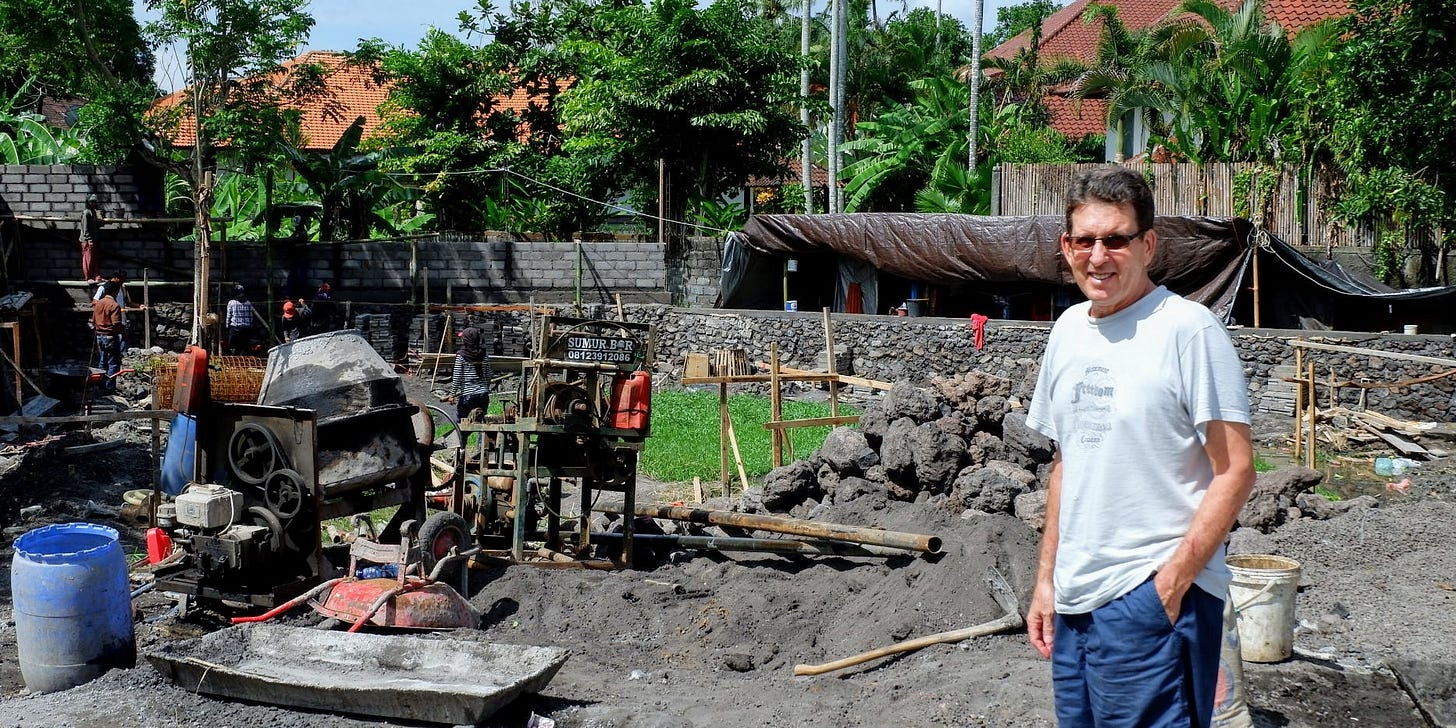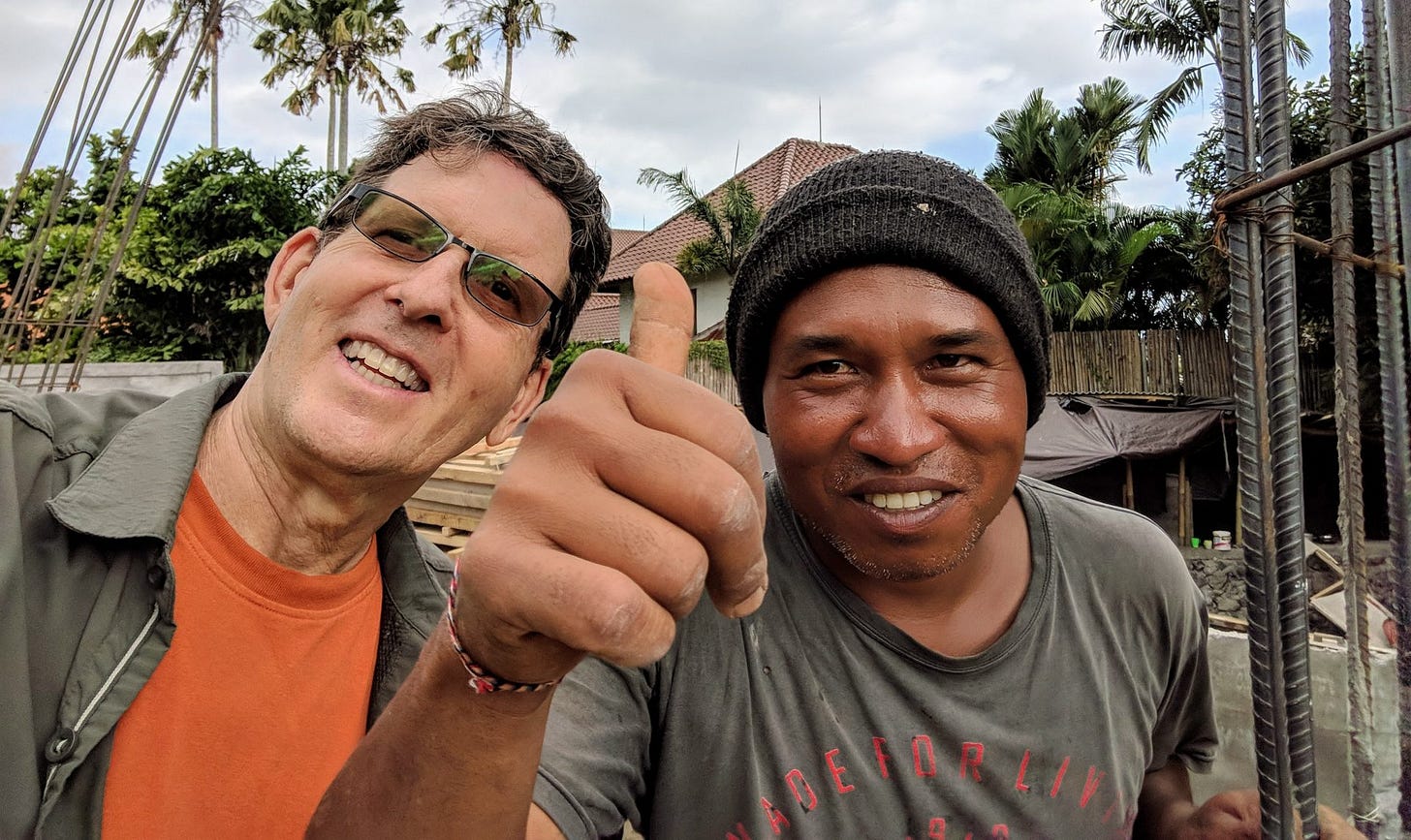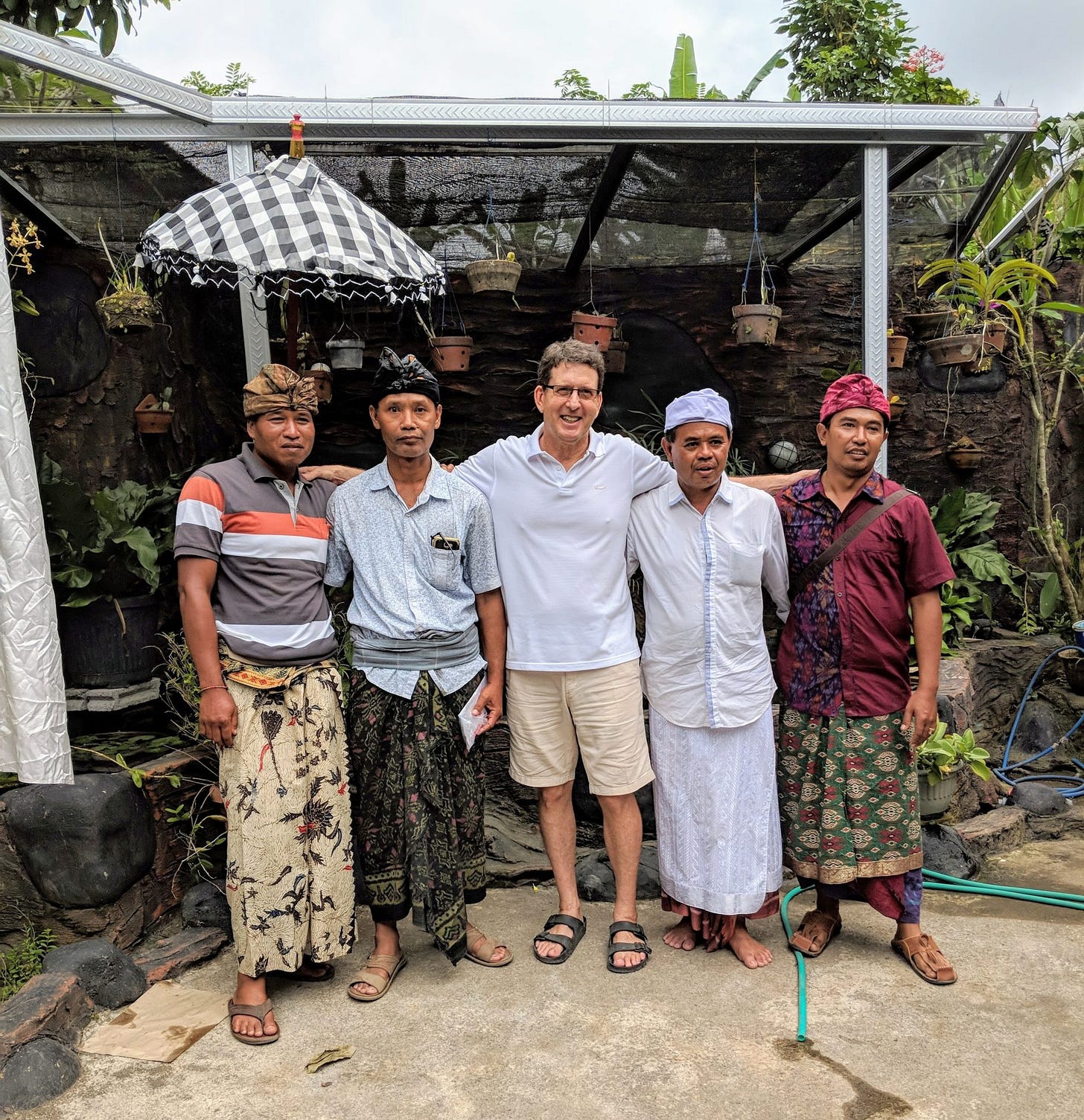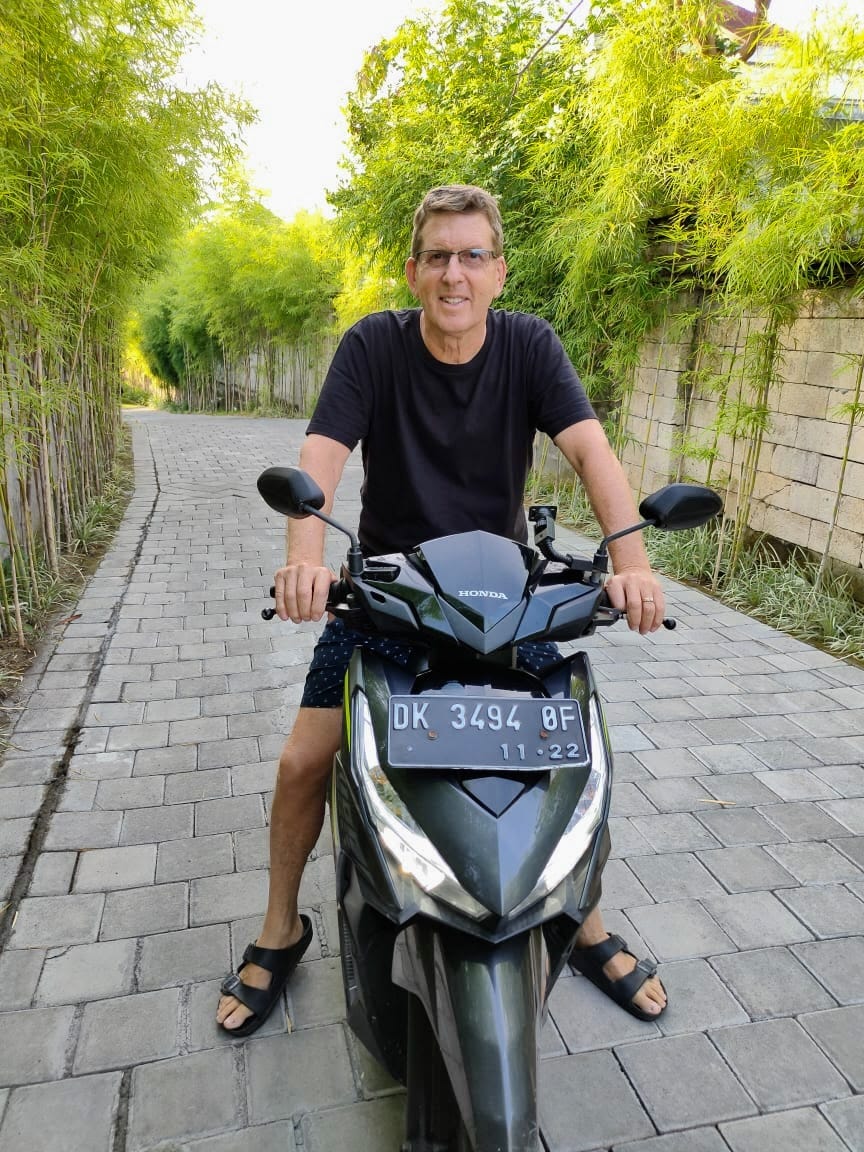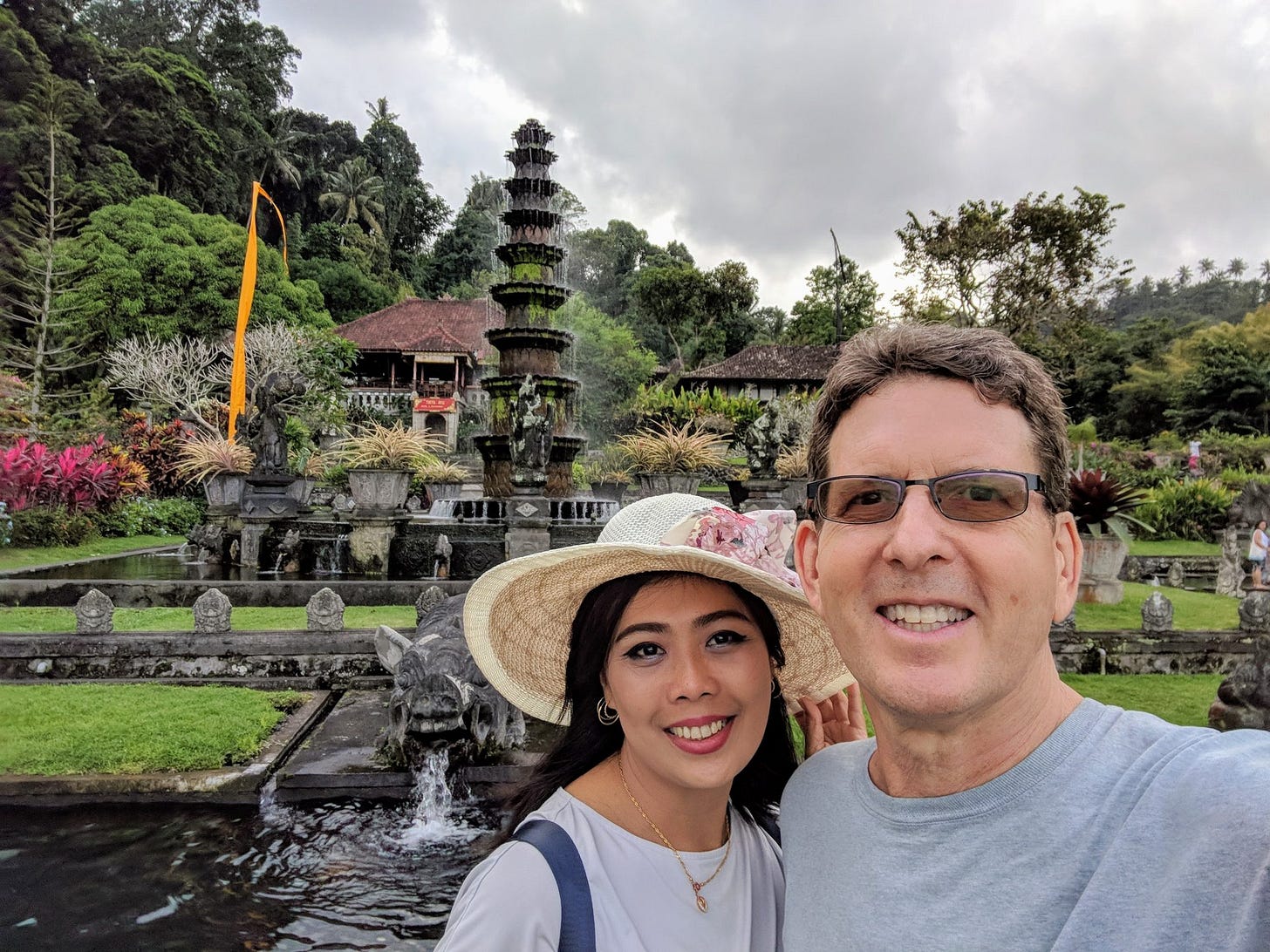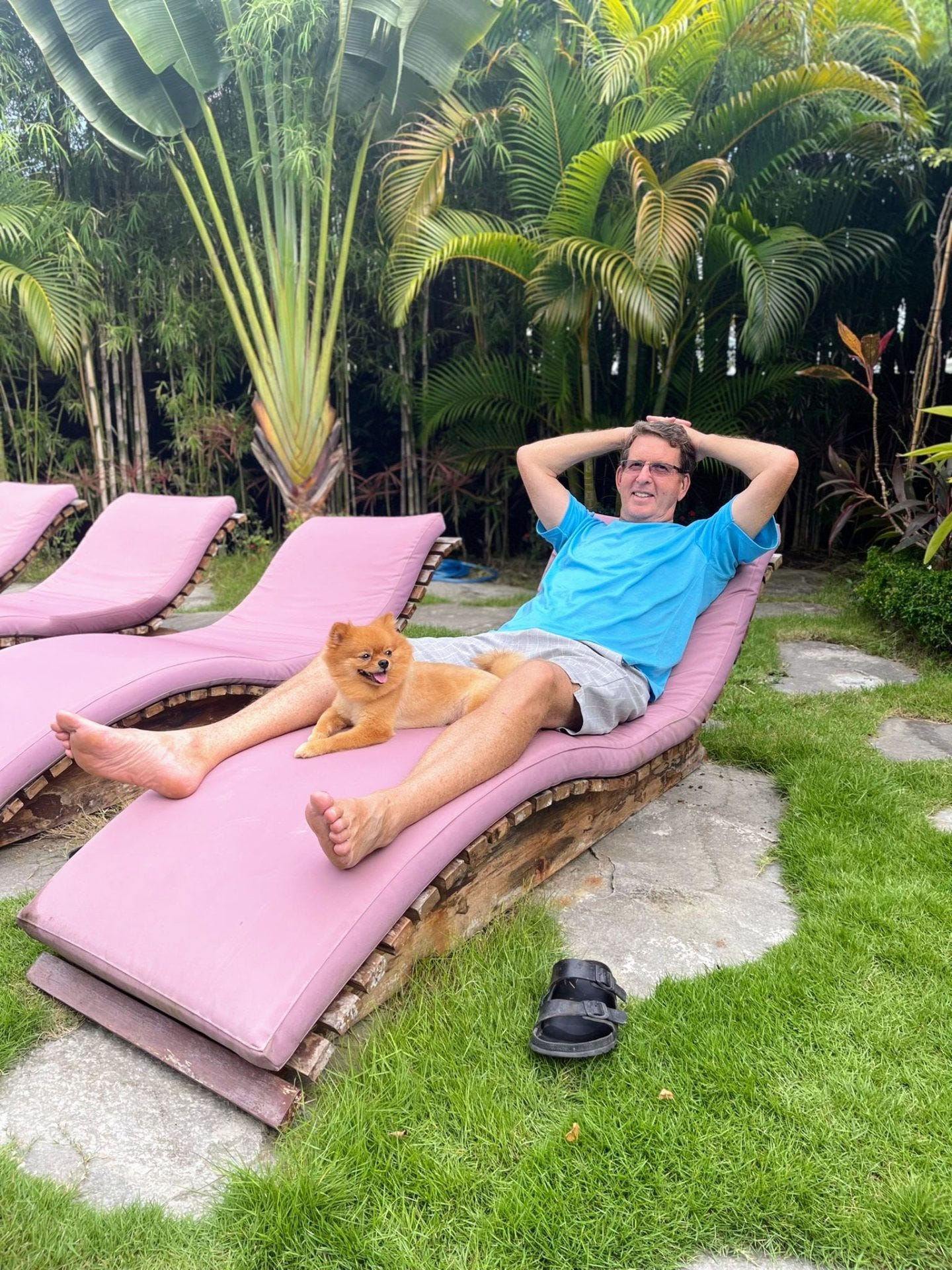American retiring in Bali with a passion for building a retirement community
Article featuring yours truly in, "Our Year in Bali"
It was a pleasure to answer questions about my expat experiences in Bali from Simone Collins, founder of Our Year in Bali. Enjoy.
We had the pleasure of speaking with Neill, whose journey has taken him from the USA to the serene rice fields of Bali. With over three decades of experience on both coasts of the USA, Neill’s path to paradise was not a straight line, but rather a series of explorations and thoughtful decisions.
From an initial month-long visit in early 2017, Neill felt an immediate connection with Bali’s unique “vibe,” setting it apart from other Asian destinations. This resonance led to the purchase of a villa and an eventual permanent move, marking the beginning of a new chapter in a tropical haven.
Join us as we delve into the motivations, preparations, and experiences that shaped Neill’s decision to retire in Bali, the challenges faced along the way, and the incredible opportunities discovered in this island paradise. Whether you’re considering a similar retirement move or simply curious about life in Bali, this interview promises to offer valuable insights and inspiration.
Can you tell us a little bit about yourself and where are you originally from?
I’m from the USA, both sides of the coast: born in Brooklyn, NY but lived for over 30 years on the west coast. Twenty years in California, as well as Oregon and Washington for over 10 years.
When did you first arrive in Bali, and what brought you here?
I arrived for a month-long visit in early February 2017. This was the third month-long trip in 3 years with an eye towards retiring in Asia. The first year, 2015, I spent a month in Thailand. In 2016 I spent 2 weeks in Vietnam and 2 weeks in Cambodia.
What motivated you to do a Bali retirement, and how did you go about making the decision to do so?
For some reason the Bali “vibe” resonated with me almost immediately, unlike the feelings I had in Thailand, Vietnam and Cambodia. Those other countries have their beauty and specialness, but both the Balinese people and the entrepreneurship here won me over. The closest I came to getting sidetracked was in Kampot, Cambodia (home of the best black pepper in the world). It’s a small river town and it’s been growing leaps and bounds these past 5 years or so.
How did you prepare for your retirement and the move to Bali? Did you encounter any challenges during the process?
During my month-long trip to Bali in February 2017 I was so taken by the island that after 3 weeks I started looking at villas, mostly as a lark. But as fate would have it, I found a brand new villa about 90% finished, with an outstanding rice field view, about 8 minutes north of Canggu by scooter. At first I thought it was silly to buy it before I was ready to move to Bali, but it was one of these emotional connections that you sometimes get with a house. In this particular case I was able to specify the final finishes that I wanted, and the developers would live there for the 6 months or so it would take me to go back to the USA and unwind my possessions, etc. This meant the villa would be safe until I arrived as a fresh expat.
For the visa process I found an agent online, and while I was worried about losing the $800 USD I had to send in advance, everything worked out smoothly. When I arrived in Bali I was met at the airport by my “online girlfriend” who I met on Tinder about 2 months before moving to Bali. She’s Indonesian and of course she helped make the transition a lot easier than if I had moved to Bali on my own. Seven years later we’re married and all is well.
Where in Bali do you live, and what made you choose that location?
I’ve lived in three places in Bali. I bought a new villa north of Canggu, as mentioned above, because Canggu was not terribly busy at the time and the offerings there – from food to entertainment to the beach scene, was irresistible.
In less than a year I decided to rent my villa, as I found it too big a space for just my girlfriend (and now wife) and myself. It has 3 bedrooms plus a TV room (which can also be a guest room). I found a lovely Australian family that was sending their three girls to the Green School in Ubud, and they rented my place for 2 years, making much better use of the villa than Shelly and I were able to.
During that time, while renting out my villa, we moved to a “cabin” rental near Pererenan beach. I bought land 800 meters from the beach and planned to build a boutique hotel / fancy guest house (called Ohana Retreat Bali). I had done some speculative real estate development in the USA, after leaving Silicon Valley (when you’re over 50 years old you’re a dinosaur in the high tech world), and decided to work with a young Indonesian architecture firm and build something with a Balinese builder. It was 3 months of design plus a full year of construction. In the end it was very rewarding (hindsight only), as we really loved living there and meeting guests from all over the world.
Less than 9 months into our new life in hospitality Covid-19 decided to visit. During those two years we had on average 1 guest a month (Ohana has six rooms plus an apartment). Sometimes we enjoyed having a private hotel just for my wife and I, but in reality that isn’t what anyone wants (for more than a week or so). In addition I decided that hospitality isn’t really for me, and so we sold Ohana the same month the airport opened post-Covid (knowing that if we held it longer we could avoid the Covid discount).
Now I live where mostly locals live, on a dead-end street, in Dalung. We spent a year building a house and moved there in April 2023. It’s a nice change of pace from living among tourists. There’s a few bule (foreigners) renting rooms or small villas here and there, but mostly it’s a “suburban” Bali scene. I say suburban because it does not have a history as its own village. About 10-15 years ago some local developers started building kavlings (row houses) among the abandoned rice fields and undeveloped land.
How would you describe the positives of retiring in Bali? Include example ideas like cost-of-living comparisons.
There’s a dramatic difference in the cost of living between the USA and Bali. Building a house, even with relatively expensive land costs in Bali is perhaps ⅕ of the cost in the USA. Having done speculative building there, starting with raw land, permits, contractor bids, etc – to staging the homes for the purposes of selling them – I know the details. It can be as much as ⅙ the costs in more popular places like the San Francisco Bay Area. So simple math converts a $250k USD house in Bali (including land) to $1.5m USD. And since taxes are 1% of the value, that converts to $15k USD per year in USA property tax, compared to well less than $1k here.
I should mention that if you buy a villa from a developer you may save ⅓ of the USA price, not ⅕ or more. But you will need to spend a year of your life visiting the building site and essentially being a part-time project manager.
Other positives are the weather (if you like the tropics for 12 months a year), the friendly people, island life, and lots more.
What are some challenges you face when living in Bali? How do you overcome them?
I’d say the infrastructure challenges are increasingly annoying. Maybe 40% of the time. I’m 67 years old and still drive a scooter, but at some point I’ll probably hire a driver or buy a small car. But I won’t drive the car, as it’s too frustrating.
We’ve had some difficulty getting our final building permit, but now we’ve resolved all of the bureaucratic demands from the government office and are hopeful about receiving our final approval soon.
Language is a problem, as my brain only understands a little of Bahasa regardless of whether I hire a teacher or use an app. But I also rely on my wife too much, and so now I’m stuck with mostly English. The little Bahasa I use is enough to show the locals that I’m not a full-on tourist, but I do regret not being able to have deeper conversations with some of the fine people I meet here.
The best way to face one’s challenges is to remain optimistic. Over time most things work out, and anxiety makes it worse.
You started the Facebook group Retire in Bali with nearly 15k! Tell us more!
For almost 4 years I’ve been trying to develop a retirement community in Bali. A gated community for 55+ with resort-like amenities etc. The development partner I have recommended I start the community online and that way, when we get the community built, we can have a list of seniors ready to join. I really don’t like social media but I do like my partner, and so I listened to him. After doing very little the group of mostly Australians has grown to almost 15k. If I was even mediocre at social media it would probably be double the size, as most people who join are worried about the increased cost of living in Australia, etc. And that problem is only growing. Bali is a great alternative, but the best option for seniors is probably to rent a villa in Sanur. At least until senior community housing gets established.
How has living in Bali influenced your life, and what opportunities have you found here?
My 7 years in Bali has changed me quite a bit, mostly in the sense of not wanting to do unnecessary things. Just sitting on my terrace after the heat of the day has passed and enjoying even the slight breezes that are no longer “hot” is so lovely (I can’t really say “cool breezes” because it’s never really cool here). And then looking up in the sky and maybe seeing a few kites that the Balinese are flying in my neighbourhood. Well that’s the icing on the cake, so to speak.
The main opportunity here for me has been this idea of senior community housing. My efforts have not been fulfilled yet but sometimes the pioneering discussions are like tiny ripples in a pond that grow a bit bigger as others engage in the conversation. Once the Bali International Hospital opens its doors any month now in Sanur we’ll see more and more discussions not only about medical tourism, but retirement in Bali too.
What do you think are the biggest misconceptions about Bali, and how would you correct them?
Bali can be marketed as a paradise, but it’s far from it. There’s not only infrastructure problems, there’s pollution from plastics, rice and garbage burning, poverty, and less opportunities for women than in most first-world countries, etc.
I don’t think stopping tourism is an answer as it’s deeply embedded with the Bali economy. Encouraging visitors to areas of Bali outside of the southern tourist zones would be an improvement.
The middle class in Indonesia is young and getting stronger and the forecast for 2050 is that Indonesia will be the fourth largest country in the world by GNP (gross national product) and in the top 10 countries by the mid-2030s.
Can you walk us through what a typical day looks like for you in Dalung?
When we wake up (around 6:30) we have a few chores to do before we take our morning walk around the neighbourhood. Sometimes we bring 1 or 2 of our 4 dogs (I know that’s too many so talk to my wife). Then it’s breakfast and after that I get up to date about the news of the world, as well as check for messages regarding my senior community project, my Facebook group, etc.
We are lucky to have a maid that prepares our lunch, although my wife goes to the pasar (local market) to buy fresh meat, fish, veggies and fruit. Lunch is the main meal of the day for us. I may have meetings a few times a week, but until my partners and I lock in a land deal and financing for a senior community, I consider myself partially retired.
What would you say is the best thing about living in Bali?
I like living on an island, although most days I might not be very aware of it. But I do believe it’s part of the vibe here, as it made the Balinese a remarkable culture. As you’re aware, islands are unique ecosystems, and that includes the people.
What are some factors that retirees looking to live in Bali should consider?
If you don’t have an Indonesian partner you will certainly be faced with more challenges. But if you dip your toes in and get off of the tourist track for maybe a month or 2 month visit, you’ll find out whether it’s for you or not. If you are frail or worried about adjusting to the particularities of life in a foreign land, then it’s perfectly OK to be a short-term hotel visitor. If you have a sense of adventure and are willing to deal with a bout of Bali belly or a spider bite, then the positives FAR outweigh the negatives in the Island of the Gods.
Is there anything else you would like to share about your experience living in Bali that we haven’t covered yet?
I discussed the Bali “vibe” a couple of times and I don’t mean it to be some hippie notion or some new age nonsense. If you don’t feel the specialness of Bali, that’s perfectly fine. I still miss the Amalfi coast of Italy from time to time. And the golden evening light in the wine country north of San Francisco is mind-bendingly beautiful. And other places too. But Bali is good enough for me, most of the time.
This article was originally posted here.





